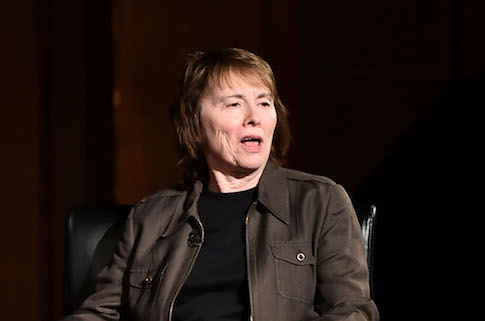Camille Paglia puts her personality on full display in her critical writing. She shoots straight about her desires and fears for society, and her essays are polemical without being preachy or pandering. Her new essay collection Provocations covers a variety of topics in eight general sections (Popular Culture; Film; Sex, Gender, Women; Literature; Art; Education; Politics; and Religion), so you can find her opinion on just about everything by thumbing through its 681 pages. There's a delightful trip-down-memory-lane quality to the book—it covers cultural touch points from David Bowie to Alfred Hitchcock to the Clinton White House.
The essays selected reveal how Paglia sees herself. She is a Romantic, first and foremost, and doesn't hide it. Watchwords that telegraph her approval include: pagan, bohemian, spontaneous, Dionysian, liberated, and, of course, Romantic. In art and culture, these forces of intuition and sensuality are at war with the diabolical forces of moralism, which come with their own watchwords: puritanical, dogmatic, sanitized, pious, authoritarian, and Victorian.
Provocations includes enough criticism of feminism and political correctness to maintain Paglia's bona fides as a scourge of progressive social pieties. In addition to critiques of university administrators that sound like they come from an archconservative, Paglia provides a historical explication of how gender and racial "add-on programs" came to be intellectual culs-de-sac. Saying humanities departments were too insular in and after the ’60s and needed to reincorporate historical perspective (partly due to New Criticism's decontextualization), she argues these new race and gender departments became balkanized and comfortable ignoring biology, religion, and anything else that pressed upon their ideological bubble.
"[N]ew highly politicized departments and programs were created virtually overnight—without the incremental construction of foundation and superstructure that had gone, for example, into the long development of the modern English department. The end result was a further balkanization in university structure, with each area governed as an autonomous fiefdom and with its ideological discourse frozen at the moment of that unit's creation," Paglia writes. These programs "were rarely if ever founded on authentic scholarly principles; they were public relations gestures meant to stifle criticism of a bigoted past." She would know—she was there.
Paglia needs more support for her argument dismissing the MeToo movement, however. It reminds her of religious fundamentalism and "Victorian archetypes" in silent films, so she sidesteps the task of evaluating allegations on the merits. Nevertheless, she supports her point that male workplaces are socially ingrained and therefore slow to adapt, and the recent Supreme Court fight bolsters her contention that many unfairly believe the worst about men.
Paglia's libertine views on sex define her persona, and an entire book of her writings provides a sampling of her eccentric ideas. In addition to contending that women should simply deal with sexually predatory bosses by "whack[ing] that tender member," she argues that the proliferation of digital pornography "reorient[s] our high-tech consciousness toward our baseline identity in the fleshly and the organic." Watching sex on a computer screen seems like the last thing to reorient one's consciousness to the organic, but I haven't authored any 700-page books on sexuality.
Paglia dismisses moralists of all kinds but still considers the moral dimension. This requires getting comfortable with a high level of moral tension. Recognizing the social cost of widespread divorce doesn't stop her from taking pleasure in the sex scandal that ended Eddie Fisher's marriage to Debbie Reynolds. Reynolds was emblematic of "the postwar cult of cheerful, girly blondes," and that was enough for Paglia to cheer on Elizabeth Taylor destroying her marriage. Paglia isn't there to cheer when a family in Missouri is torn apart by infidelity and divorce—they fail to do it with the style of Hollywood celebrities. A moralist might say that should give Paglia pause about glamorizing the divorces that helped normalize the breakdown of the family since the '60s.
Paglia insists the legacy of the '60s was corrupted and ultimately lost by the antisex feminists and poststructuralists of the 1970s and '80s. To her, '60s spiritualism was squelched among academics and secular elites but lived on via the New Age movement. Much as conservatives would be tempted to blast Paglia for '60s nostalgia, she deserves credit for seeing how the qualities she celebrates also led to excesses and even tragedies. The longing for collective spirituality also enabled Charles Manson's cult. The quest for higher consciousness also got many trapped into drug habits that destroyed them. Her views on the 1960s' true legacy are idiosyncratic, but she articulates them persuasively, notably in the essays "Cults and Cosmic Consciousness" and "The Mighty River of Classics." Garden-variety cultural liberalism often exhibits ignorance about what came before the Beatles performed on The Ed Sullivan Show, but Paglia's celebration of the ’60s places it in continuity with achievements that came before.
Paglia takes pride in her work as a pioneer in online writing, and the book tells part of the story of journalism's evolution since the advent of the internet. She reproduces an audience-interactive chat with a drag queen about the 1996 Oscars and numerous short Q&As with readers. The back of the book has a "media chronicle" that lists web posts, TV appearances, and much more. She has defended the internet's democratizing power and celebrated how it's been harnessed by entrepreneurs like Matt Drudge, which is notable for someone who approvingly cites media critics Marshall McLuhan and Neil Postman.
Provocations chronicles Paglia's love-and-hate relationship with religious authority and traditional standards, her antagonism toward progressive ideology about transgenderism, and her intellectual iconoclasm. As she has acknowledged, rebels need something to rebel from. But unlike many contrarians, Paglia engages deeply in the literary canon and the historical context of art and culture, and her focus is rarely on herself. She provides readers of any ideological stripe with ample food for thought.
